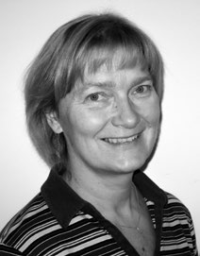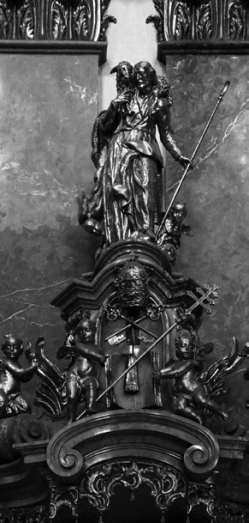
Ivana, I have known you since the time when I started to work in Comeniology Department of Prague Institute of Czech Academy of Sciences. My colleagues from Theological Faculty have been cooperating with you for years as with an experienced and conscientious editor. Nevertheless, you might have to introduce yourself a bit to most of the readers of Doxa.
I am a typical Prague person. I was born and grew up here and I have been working here all the time. I studied Czech and history at Faculty of Arts at Charles University and specialised in pedagogy. Because in the totalitarian regime I did not want to teach children something which was contrary to my conscience, I started to work with comeniologists in Pedagogy Institute of Czech Academy of Sciences. A one-year internship got extended for five years of specialist work. After the revolution in 1989, I started to work as an editor in the catholic publishing house of Zvon. My memories of its early years are unforgettable: devoted enthusiasm of all the colleagues, their courage to go on thin ice – and mainly the individual people: Václav Vaško, Oto Mádr, Václav Ventura and many others. When the activity of Zvon was finished ten years later, I went to work in Karmelitánské nakladatelství publishing house. First, I experienced again something similar to the “Zvon” euphoria. Nowadays, KNA is a well-established stone-and-mortar publishing house. In the current difficult economic situation of the company, I work as an external editor for them.
What about your studies at Catholic Theological Faculty of Charles University?
After the summer holiday in 1989, I started to attend a catechetic course for laymen. The lectures took place in a pub in Ořechovka in Prague. I remember the waiters running among the tables full of students and tried to be invisible. The second half of this one-year course was already held in the assembly hall at one faculty of Czech Technical University. During our final exams, we were encouraged to see the course as a starting line of our theological education. I was not too happy to continue with my studies, I wanted to start to see “the first fruit”. So, I started teaching religious education at primary school. About five years later I started to feel the desire, but also necessity to continue my studies and gain more knowledge and experience. At the same time, I wanted to build a certain extension beyond the fields studied at Faculty of Arts of Charles University. In 1995 I started a four-year distance course in the field of religious studies at Catholic Theological Faculty of Charles University.
It was an “old-style” distance education. Didn’t you think it was not the right thing?
Yes, it was an “old-style” distance education. A classroom full of students from all over the country writing their notes in restricted conditions. Despite the effort of the lecturers, I could feel that the expected standard of university studies was not fully achieved. It was due to a serious lack of qualified lecturers and turbulent crisis accompanying the situation of the former dean Václav Wolf and his successor Jaroslav Polec. And to be honest, some students were not capable enough for the studies.
Although the studies were a bit superficial – did you get to like any subjects? Were you inspired by any teachers?

St. Ignatius Church, Prague (photo: Pavla Glombová)Yes, I still remember your lessons of Biblical Greek. I also remember Štampach’s lectures on fundamental theology. Without reading anything from a piece of paper, he comprehensibly explained logically coherent topics. He was open to help students and ready to prepare a special lecture upon request. The lectures of the moralist Jiří Skoblík were also enriching. His clear examples sparked off lively debates and forced us to re-evaluate rooted ideas. However, the matter of my heart were the lessons with Bohumil Kolář who lectured catechesis.
We remembered him in the last issue as it was one year anniversary when he passed away at a ripe age. What are your memories of him and his teaching?
Father Kolář was not a conventional teacher in the sense that he would present catechetics in a structured way or an outline of catechetic theories. That might be the reason why some students mistakenly considered his lessons to be mere sharing of his catechetic experience. In his lectures, he passed down on us the most precious knowledge he had gained from his life experience. I did not miss a single opportunity to listen to this big-hearted and humble person. He approached every human soul with love and respect, he longed to show God to them and accompany them on their way to Him. Thanks to him I realized that despite doing my best, having the best tools and detailed plans, without love I will only be a “sounding metal”, a bell without a tongue.
Have you used your theological education properly?
Yes. Mainly in my spiritual life where it helps to achieve a deeper understanding of my own faith. It sets and guards the way of searching, examining and decision making.
Naturally, it is the basis for my catechetic activities. Even though it seems that it is enough to tell a Biblical story to children with the help of pictures, you should never underestimate their curiosity. I must admit that questions of ten-year-olds can take me by surprise sometimes and force me to open my notes or a book again. Children must always be told the truth, only adequately to their age. Catechists, together with their parents, teachers and priests inscribe the ABCs of faith in children’s souls. They are responsible for it to be passed on correctly and honestly. Faith is the most precious treasure, and we must look after it with all the possible care. But we can only do it if we know it.
To a significant degree, theological education helps me in my profession. I edit books about spiritual life, religious documents, philosophical or history books, life stories of extraordinary religious personalities. Without my theological education I would not be able to work with the texts responsibly.
How exactly did your studies help you in your editorial work?
Mainly for serious religious documents, I fully use my knowledge from the field of fundamental, dogmatic, moral and pastoral theology, Biblical studies and canon law. It applies for example to my work on Catechism of the Catholic Church, Documents of the Second Vatican Council, Youcat, some encyclical letters etc. Liturgical studies helped me significantly to edit the texts of the breviary, The Weekday Missal, lectionaries and last but not least, the newly issued Bohemia missal.
And finally, what would you wish to the faculty?
To be able to teach at a professional level and pass onto its students not only knowledge, but mainly the desire to get to know the beauty of the universe, admire it and thank God for it with gratitude.
The text was first published in DOXA vol. 3, no. 1, December 2016, pp. 17-18.